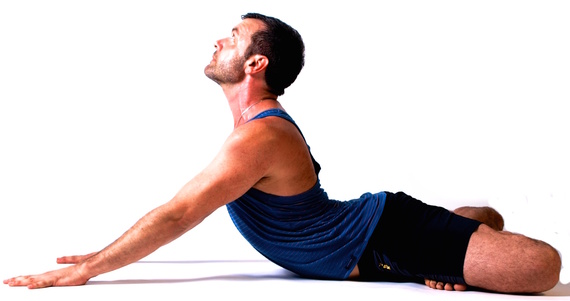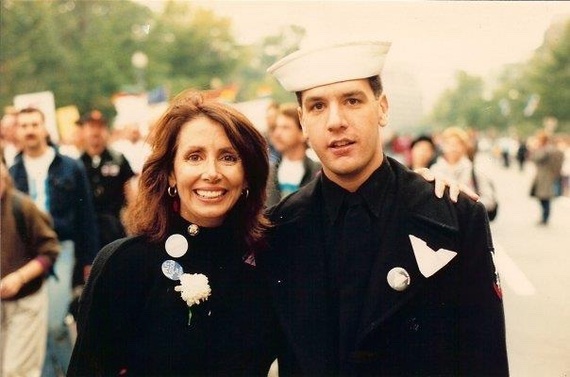Whether you know it or not, you may be a very experienced yoga practitioner. I can look back on the time before my first yoga class and see that I was navigating my inner world just like Patanjali says we all do in his Yoga Sutras, the text that many practitioners follow to guide yoga practice. And, without any knowledge of yoga, I organically found tools that helped me cope and thrive, as all humans also try to do.
Studying yoga gives us a vocabulary and process for survival, but the parts have always been there, whether or not it's called yoga.
When I went away to U.S. Navy Boot Camp at age 19, it was after months of preparing myself mentally and physically. Not interested in just getting by, I wanted to excel. But nothing could have prepared me for those eight weeks of total isolation from the world. That scary new reality, combined with pretending to be straight in the pre-DADT military, made for the most stressful time yet in my young life. Nonetheless, it turned out that I did much better than I expected, in part because of the prep work I had done, but also because my mind found, all on its own, something to do to make the experience less awful.
I made a good friend there named Murphy. One of the things that both of us observed there was that, in our boot camp isolation, we were able to silently listen to entire albums in our heads as if they were playing on headphones. Instead of taking notes during class he and I would write lyrics to entire albums and then pass them to each other.
I can't remember what Murphy was listening to in his head, but I thought David Bowie was fairly godlike at the time. I had been especially interested in his Scary Monsters album in the weeks leading up to boot camp, so that was in heavy rotation in my head. Now, without access to music, I listened to it whenever and wherever I needed to. And it really helped. It made me feel less like an impostor and more like I belonged, as all effective yoga practices coincidentally do.
A silent boot camp listening party for one probably can't be called yoga practice if the definition of yoga practice includes an intention to do yoga, because I had no idea what that meant at the time. But, what I experienced was that, intentionally or not, my mind found ways to feel better. And according to this standard, we are all yogis. We all try, successfully or not, to hurt less.
If we are doing Patanjali's yoga, just one of many forms, the path to less suffering is trod via the repeated endeavor to concentrate the mind on some thing or another- which is exactly what I was blindly doing. Thirty years years after boot camp.
Thirty years years after boot camp.
It wasn't until many years later that I learned the names for all of the aspects of what was happening. Now that I have a grasp of the parts and how they work, I can harness the pre-existing aspects of mind, in the context of what most people would recognize as a yoga practice, to accelerate and steer myself toward the path toward less suffering. Learning yoga helped me work the system better. But, what if I never learned yoga?
One of the things I love about the yoga sutras is that it's not just a guidebook for a kind of practice. It also describes pretty accurately just how the human mind works.
Compare Patanjali's sutras to the work of Freud. Freud painted his picture of the mind's parts and patterns, and he presented a technique for working, within the context of that picture, toward less suffering. Patanjali does both of those as well. Understanding his sutras that describe the human condition means simultaneously arming yourself with the necessary tools for accelerating the move toward less suffering. Patanjali describes what makes us suffer and describes the pathway away from such suffering, which can be trod with intention, as through practice; or which can be meandered along with varying degrees of blindness, as was the case with me in boot camp. But, all of us are on that path toward less suffering. Structured yoga practice provides a way to move in the right direction a bit faster and with more clarity.
All survivors have one thing in common -- they made it. All survivors (that means you!) have done what they need to do to survive with less suffering. And while different yoga texts instruct different techniques for thriving in this life, Patanjali's practice is all based on concentration. In short, he says that if we can concentrate on something, it makes the mind temporarily still, which allows us to experience that which lies silently beneath noisy thought -- untroubled true nature. According to Patanjali, concentration will set you free.
"Concentrate on what?" one might ask. Patanjali's answer to that is simple. It is, "Whatever." After listing several specific options for concentration, like breath, bliss, and subtle sense perceptions, he says, in Sutra 1.39, "Or by focusing in whatever manner desired". And while concentration was not something I thought I could do at age 19, it turns out I was wrong.
All I needed was David Bowie. My chosen object of focus, I found the Thin White Duke to be deserving of my attention, and my attention he got.
In boot camp, I unknowingly used my remembrance of music as a silent mantra that provided something necessary -- it soothed me and made me feel connected. Now that I know what mantra is and how it functions, I understand that, although it was several years before my first yoga class, I was using concentration as a means to help myself deal. I'm still doing it, but now I call it yoga practice.
